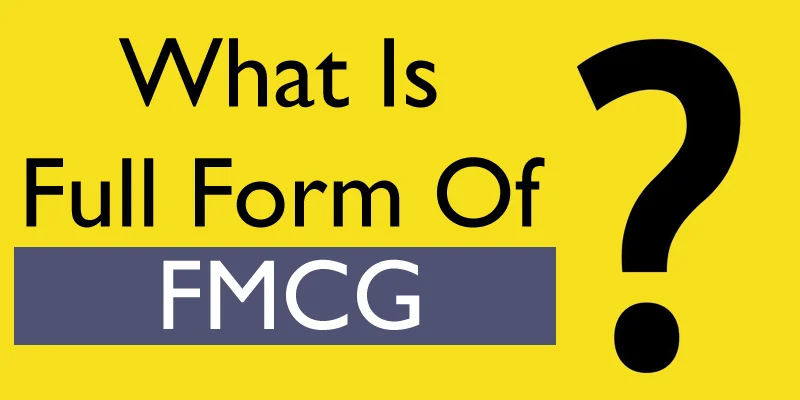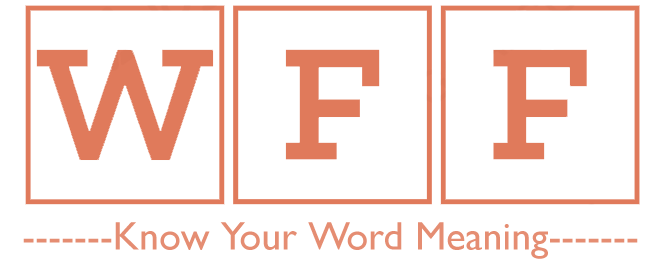Do you know what is the FMCG Full Form? The full form of FMCG is Fast Moving Consumer Goods. FMCG (Fast Moving Consumer Goods) are products sold quickly at relatively low prices. These are everyday items that people consume on a regular basis, such as food, beverages, cosmetics, and household products. The FMCG industry is an important sector of the economy and substantially impacts people’s daily lives.
In this article, we will discuss FMCG in Full Form, the importance of FMCG products, the Types of FMCG Products, FMCG products in India, and the FMCG industry.
Table of Contents
What is the FMCG Full Form?
FMCG Full Form – Fast-Moving Consumer Goods
What is FMCG?
Fast Moving Consumer Goods (FMCG) are regularly consumed and relatively cheap products. These products have a short shelf life, and consumers prefer to buy them repeatedly. FMCG products are generally sold in large quantities and have low profit margins per unit. Examples of FMCG products include packaged food and beverages, personal care products, household cleaning products, and toiletries.
Importance of FMCG products
FMCG goods play a vital role in daily life. They are products that are essential for daily operations and are frequently used. The FMCG sector is vital in providing essential items for everyday life. People of all ages, sexes, and socioeconomic backgrounds consume FMCG products. These goods are widely accessible to all as they are easily available in grocery stores, retail stores, and online.
Key Features of FMCG
Fast turnover rate
FMCG products are characterized by their fast turnover rate. Most FMCG products are sold out within a few days or weeks and need to be replenished frequently. This is because FMCG products are usually perishable or have a limited shelf life, and consumers must buy them regularly.
Low-cost and high-volume production and distribution
FMCG products are produced in large quantities and are distributed through well-established retail channels. This enables manufacturers to keep their costs low and offer reasonably priced products. FMCG products’ high volume production and distribution also help ensure that they are widely available to consumers.
Short shelf life
FMCG products have a short shelf life and need to be replenished frequently. This is because FMCG products are often perishable or have a limited shelf life. For example, food and beverage products have a short shelf life and must be consumed or disposed of within a certain period. Similarly, personal care and household cleaning products must be replaced regularly.
Frequent replenishment
FMCG products require frequent replenishment due to their short shelf life and regular consumer use. Consumers must regularly purchase FMCG products such as food and beverages, personal care products, household cleaning products, and toiletries to meet their daily needs.
Types of FMCG Products
Fast-moving consumer goods, or FMCG, are consumer goods that have a short shelf life and are consumed quickly. They can be classified into several different types, including:
Food Products
Processed foods, such as cheese products, cereals, and boxed pasta, are FMCGs that are popular among consumers. This category also includes prepared food, such as ready-to-eat food.
Drinks
FMCGs in this category include bottled water, energy drinks, and juices. These products are used frequently and require regular replenishment.
Baked Goods
Baked goods such as cookies, croissants, and bagels are popular FMCGs. These products are often consumed as snacks and require frequent replenishment.
Fresh, Frozen and Dry Goods
This category includes FMCGs such as fruits, vegetables, frozen peas, carrots, raisins, and nuts. These products need to be replenished frequently because of their short shelf lives.
Medicines
FMCGs in this category include aspirin, painkillers, and other drugs that can be bought without a prescription. These products are frequently used daily and require frequent refills.
Cleaning Products
Cleaning products, such as baking soda, oven cleaner, and window and glass cleaner, are FMCGs that are essential household items. These products are used frequently and require regular replenishment.
Cosmetics and Toiletries
Hair care products, concealers, toothpaste, and soaps are FMCGs that fall into this category. These items must be replenished frequently because they are used daily.
Office Supplies
FMCGs in this category include pens, pencils, and markers. These products are essential office supplies and are consumed at a fast pace.
FMCG industry
The FMCG sector is vital for the economic growth of any country. It’s a very competitive market, and businesses always look for ways to differentiate themselves and their products from their competitors. Food and beverages, personal care, household cleaning, and toiletries are just some of the subsectors that make up the industry. The FMCG sector has high sales volume, low-profit margin, and multiple brands.
FMCG products in India
The FMCG market in India is the largest in the world. The FMCG sector in India is expanding rapidly due to factors such as population growth, urbanization, and rising incomes. Indian FMCG companies compete fiercely against domestic and foreign firms for market share. In India, FMCG products are available online, in retail establishments, and supermarkets.
Top FMCG companies in India
- Amul
- Bikanervala
- Britannia
- CavinKare
- Colgate Palmolive India Ltd.
- Dabur India Ltd.
- Emami
- Haldiram’s
- Himalaya Healthcare Ltd.
- Hindustan Unilever
- Marico etc.
- Nirma
- Parle Agro
- Pidilite Industries
- Zydus Wellness

FAQs – What Is The FMCG Full Form?
What is the FMCG Full Form?
The FMCG Full Form stands for Fast-Moving Consumer Goods.
What are FMCG products?
FMCG products are consumer goods with a short lifespan that are consumed quickly.
What are the different types of FMCGs?
FMCGs can be categorized into different types, including food products, beverages, baked goods, fresh/frozen/dry goods, medicines, cleaning products, cosmetics/toiletries, and office supplies.
Why are FMCGs important?
FMCGs are essential products that meet the daily needs of consumers and play a significant role in the economy.
How do manufacturers and retailers target FMCGs to customers?
Understanding the different types of FMCGs helps manufacturers and retailers better target their products and meet the needs of their customers.
What types of products are considered FMCG?
Everyday items with a relatively short shelf life, such as:
Food and beverages (snacks, drinks, dairy products)
Personal care products (shampoo, soap, cosmetics)
Household goods (detergents, cleaning products, paper products)
Tobacco products
Why are they called “fast-moving”?
Because they are frequently purchased and consumed, leading to high turnover of goods.
What are some examples of FMCG companies?
Unilever, Nestlé, Procter & Gamble, Coca-Cola, PepsiCo, Colgate-Palmolive, L’Oreal, Mars, Mondelez International.
What are the key characteristics of the FMCG industry?
High competition, low margins, strong brand reliance, marketing-driven, innovative, global reach.
What are the biggest challenges for FMCG companies?
Fluctuating raw material prices, changing consumer preferences, intense competition, maintaining profit margins, and adapting to new technologies.
What are some trends in the FMCG industry?
Organic and natural products, sustainable packaging, personalization, e-commerce growth, direct-to-consumer models.
Are FMCG companies good investments?
It can be stable and reliable but often offers lower growth potential than other sectors.
What are some career opportunities in the FMCG industry?
Marketing, sales, brand management, supply chain, logistics, research and development, finance.
What skills are needed for success in an FMCG career?
Strong communication, analytical thinking, marketing expertise, problem-solving abilities, and adaptability.
Thanks for reading. What is the FMCG Full Form? Bookmark our website, Whatisfullform.com, to learn about or read our collection of full forms.


